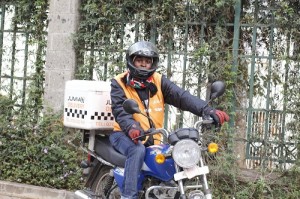In April 2013, I purchased a dress on Jumia. The reasons for my purchase were threefold; I wanted a dress, my flatmate was working for the company, and, needing a credit card purchase to ensure their system was working, he offered me a 20% discount. After an exhausting exchange of emails and phone calls, I eventually received the dress. The amount of human work involved – phone calls, emails and delivery – just for the purchase of a simple dress, revealed a company in the throes of start-up hell.
One year later, Jumia Kenya sells 5000 items per month and has become an unavoidable actor on the Kenyan reselling market. Such success is testament to the ability of Rocket Internet, the German company which owns Jumia, to apply its internet reselling business model in an economically booming country.
At heart of Jumia, The Cream of European Entrepreneurship
"Our companies succeed b ecause we provide all they need: Great people, functional best practices, funding and ongoing hands-on support” (Alexander Kudlich, Group Managing Director of Rocket Internet). It is hard to argue with the model; seven years after its creation, Rocket Internet owns 75 ventures in 134 countries.
ecause we provide all they need: Great people, functional best practices, funding and ongoing hands-on support” (Alexander Kudlich, Group Managing Director of Rocket Internet). It is hard to argue with the model; seven years after its creation, Rocket Internet owns 75 ventures in 134 countries.
Africa’s large market base and rapid development of internet services were undoubtedly the primary factors behind Rocket’s decision to invest in the continent. A (THE FIRST?) beneficiary of this decision was Africa Internet Holding, the company that created Jumia in 6 African countries. Jumia Kenya opened at the dawn of 2013.
Kenya’s economic rise
Kenya – like several other countries in Africa – presents unique opportunities for growth. On the demand side, the demographic boom provides the company with a large potential market. With fast economic growth, a middle class is emerging, creating a large customer pool for Jumia. These people are starving to access western consumption and this is precisely what the company offers. Jumia sells everything from fashion items, to electronic devices – laptop, cameras and mobile phones -, to home equipment.
On the supply side, Kenya presents undeniable competitive advantages as both land and manpower are extremely cheap (the average wage is about 3 euros per day).
Yet, besides these intrinsic qualities for company development, Kenya is not an easy place to settle in. The country lacks basic amenities, notably low internet coverage in some regions and frequent power cuts. In addition, and more importantly, Kenya is characterized by high levels of violence and corruption which seriously hindered the work of Jumia’s co-founders and employees. All the equipment at the first Jumia office was stolen. The warehouse was constantly under threat, forcing the co-funders to implement drastic security measures.
Moreover ‘Nairobbery’, as some have dubbed the capital of Kenya, has a deserved reputation for pervasive scams, which seriously hindered the trust of customers. To reinforce the customer’s trust, Jumia is offering to pay cash at the reception of the items. Also, if the customer is not satisfied, items are exchanged for free or reimbursed.
A risky but fruitful Afro-European success
Despite these challenges, Jumia Kenya has experienced positive market development thanks to its ability to solve these issues, in a local manner. A capacity to deal with local issues and adapt to hardship lies in the nature of the company itself. As each venue is constituted as an independent company, the co-founders have all the power in their hands to deal with problems. This is how, for instance, they hired Maasai guards to watch over the warehouse, as the Maasai are the only tribe allowed to carry a weapon – their traditional spear. They are also in charge of their human resources which allows them to hire and fire people at will, to suit the needs of the company at best. This constitution frees the company from bureaucratic issues, and provides it with a necessary flexibility when dealing with local issues.

In that regard, entrepreneurship culture is at core of Jumia’s success as it allows the company to take advantage of Kenya’s economic features and deal with difficulties in a local and flexible manner. Their results speak for themselves. Opening a company in Kenya is a risky enterprise, as displayed by the numerous issues Jumia faced. Yet as Varun Mittal – former intern at Jumia Kenya puts it, “To start something in Africa can be a daunting task but the rewards will outweigh the problems”.
Impacts on Kenya
Jumia has demonstrated how a company can successfully take advantage of Kenyan market features. However, assessing the success of a company purely based on its profit margin could be considered reductive in a country still characterized by high levels of poverty and inequality. Jumia has successfully taken advantage of the Kenyan boom, but for the majority of Kenyans any positive results are yet to emerge.
Caroline Guillet
Pour aller plus loin : http://www.jumia.co.ke/

